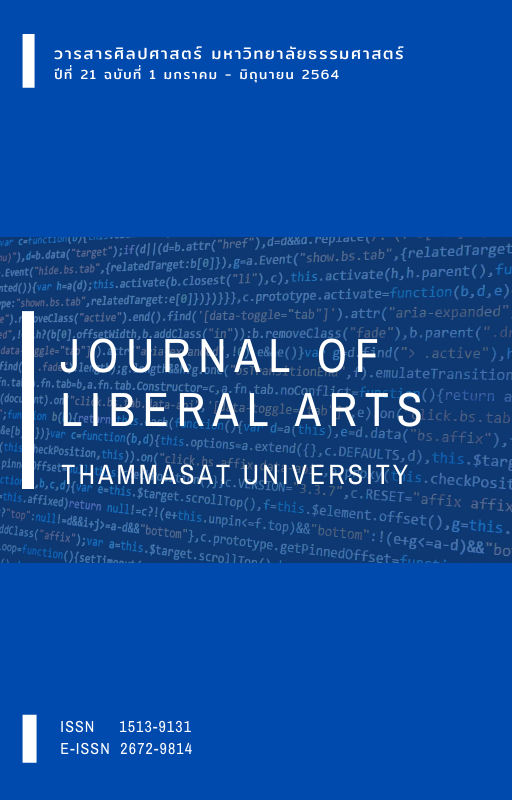พหุวัฒนธรรมกับการปฏิวัติ: ประวัติศาสตร์ความสัมพันธ์ระหว่างพรรคคอมมิวนิสต์จีนกับขบวนการทางสังคมแนวพุทธ
Main Article Content
บทคัดย่อ
ตลอดประวัติศาสตร์ที่ผ่านมาเกือบหนึ่งศตวรรษแห่งการสถาปนาพรรคคอมมิวนิสต์จีนนั้นพรรคมีนโยบายเกี่ยวกับศาสนาและขบวนการทางสังคมที่เกี่ยวข้องกับศาสนาที่เปลี่ยนไปเปลี่ยนมาหลายครั้ง โดยเฉพาะกลุ่มขบวนการทางสังคมแนวพุทธ อาทิ สมาคมลับ ขบวนการป้องกันตนเองระดับท้องถิ่น และสมาคมสาธารณประโยชน์ต่าง ๆ นั้นมีบทบาททางการเมืองจีนสมัยใหม่อย่างสำคัญมาโดยตลอด และพรรคคอมมิวนิสต์จีนก็มีความ สัมพันธ์กับกลุ่มเหล่านี้ในแนวทางที่ไม่ชัดเจนและเปลี่ยนไปมาเสมอ ทั้งนี้เพราะลักษณะของความเป็นพหุวัฒนธรรมของพรรคคอมมิวนิสต์และขบวนการทางสังคมแนวพุทธเหล่านี้มีความคล้ายคลึงกันมาก อาจเป็นทั้งแรงเกื้อหนุนทางการเมืองและภัยต่อความมั่นคงของชาติได้
Downloads
Article Details

อนุญาตภายใต้เงื่อนไข Creative Commons Attribution-NonCommercial-NoDerivatives 4.0 International License.
เอกสารอ้างอิง
Barbalet, J. (2011). Religion and the State: A Comparative Sociology. London: Anthem Press.
Bao’an xian difangzhi bianzuan weiyuanhui. (1997). Bao’an xianzhi. Guangzhou: Guangdongren chubanshe, 1997.
Cai, S. (1984). On the Origines of the Gelaohui. Modern China, 10(4).
Cai, S. (1987). Zhongguo jindai huidangshi yanjiu. Beijing: Zhonghua shuju.
Chang, M. H. (2004). Falun Gong: End of Days. New Haven: Yale University Press.
Chen, Y. (1984). Zhongguo Minzu Yundong zhi Guoqu yu Jianglai. Henan shizhi ziliao, 6.
Chesneaux, J. (1965). Les Sociétés Secrêtes en Chine. Paris: Juliard.
Davis, Fei-ling. (1971). Primitive Revolutionaries of China: A Study of Secret Societies in the Late 19th Century. London: Routledge and Kegan Paul.
Duara, P. (1995). Rescuing History from the Nation: Questioning Narratives of Modern China. Chicago: University of Chicago Press.
Duara, P. (1997). Transnationalism and the Predicament of Sovereignty. The American Historical Review, 102(4), 1030-1051.
Du Bois, & Thomas, D. (2017). Disturbances in Heaven. Acton: ANU Press.
Ebrey, P. B. (2002). Women and the Family in Chinese History. New York: Routledge.
Elegant, R. (1951). China’s Red Masters: Political Biographies of the Chinese Communist Leaders. New York: Twayne Publishers.
Helle, H. J. (2017). China: Promise or threat. Leiden: Brill.
Liu, S. (2012). Contemporary Chinese Political Thought: Debates and Perspectives. Lexington: University Press of Kentucky.
Mitter, R. (2004). A Bitter Revolution: China’s Struggle with the Modern World. Oxford: Oxford University Press.
Naquin, S. (1976). Millenarian Rebellion in China: The Eight Trigram Uprising of 1813. New Haven: Yale University Press.
Ownby, D. (1995). The Heaven and Earth Society as Popular Religion. The Journal of Asian Studies, 54(4), 1023-1046.
Ownby, D. (1999). Chinese Millenarian Traditions: The Formative Age. The American Historical Review, 104(5), 1513-1530.
Ownby, D. (2008). Falun Gong and the Future of China. Oxford: Oxford University Press.
Palmer, D. (2007). Qigong Fever: Body, Science and Utopia in China. New York: Columbia University Press.
Perry, E. (1980). Rebels and Revolutionaries in North China, 1845-1945. Stanford: Stanford University Press.
Perry, E. (1993). Shanghai on Strike: The Politics of Chinese Labor. Stanford: Stanford University Press.
Purbrick, M. (2019). Patriotic Chinese Triads and Secret Societies: From the Imperial Dynasty to Nationalism and Communism. Asian Affairs, 50(3), 305-322.
Taylor, C. (1992). Multiculturalism and the Politics of Recognition. Princeton: Princeton University Press.
Tong, J. (2002). Anatomy of Regime Repression in China: Timing, Enforcement Institutions, and Target Selection in Banning the Falungong, July 1999. Asian Survey, 42(6), 795-820.
Schram, S. R. (1966). Mao Tse-tung and Secret Societies. The China Quarterly, 27, 1-13.
Schram, S. R. (2016). Mao’s Road to Power: Revolutionary Writings, 1912-1949 (v.5 Towards the Second United Front, January 1935-July 1937). New York: Routledge.
Strong, S., & John, S. (1973). A Post-Cultural Revolution Look at Buddhism. The China Quarterly, 54, 321-330.
Vogel, E. F. (2011). Deng Xiaoping and the Transformation of China. Cambridge: Harvard University Press.
Wu, J. S. (1975). Understanding Maoism: A Chinese Philosopher’s Critique. Studies in Soviet Thought, 15(2), 99-118.
Yu, D. C. (1971). Buddhism in Communist China: Demise or Co-existence. Journal of the American Academy of Religion, 39(1), 48-61.


